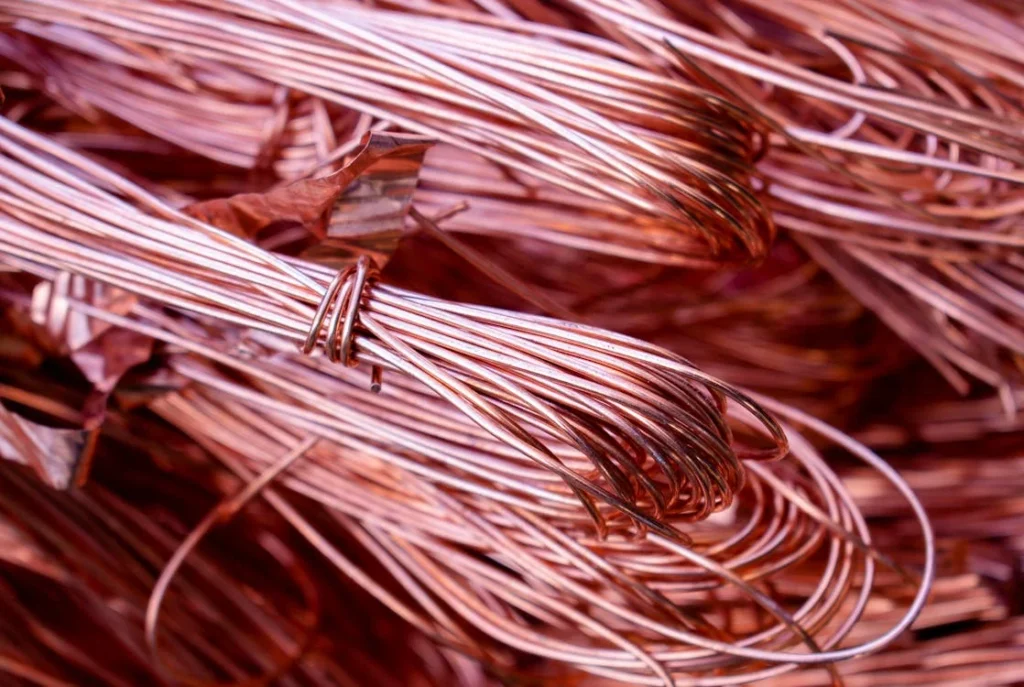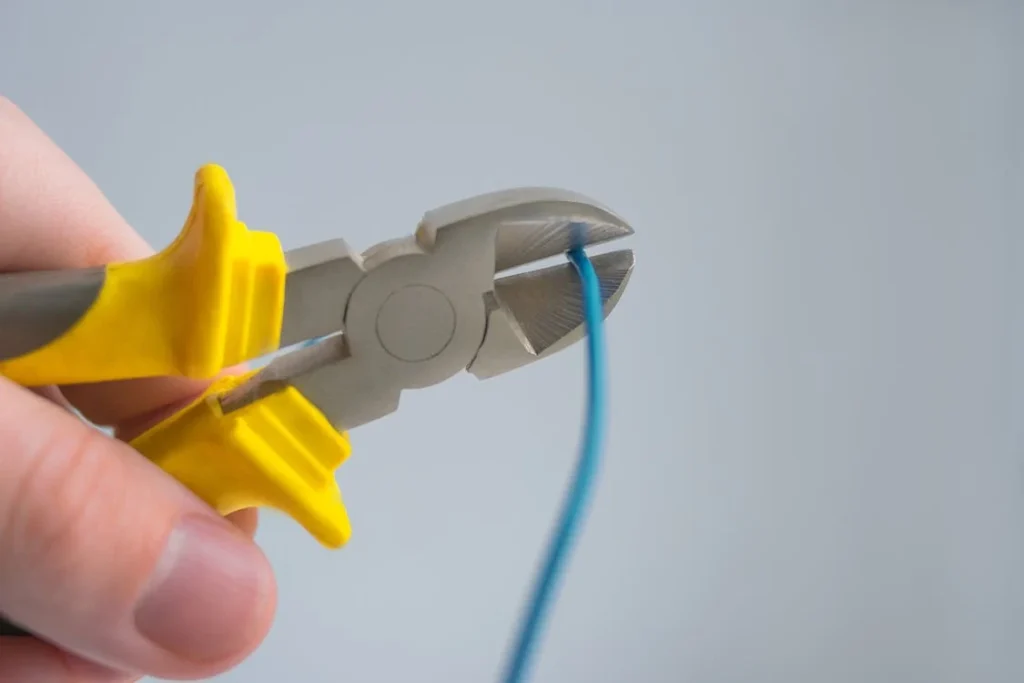While both materials perform similar functions, their distinct characteristics make them suitable for different applications.
Bare copper wire, which is pure and untreated, offers excellent conductivity and durability, making it the preferred choice in many industries.
Tinned copper wire, on the other hand, is coated with a thin layer of tin, which provides additional protection against corrosion, especially in harsh environments.
At Sv Electricals, we supply high-quality bare copper wire designed to meet various industrial needs.
Difference Between Tinned Copper And Bare Copper Wire
When it comes to choosing between tinned copper and bare copper wire, understanding their differences can help determine the best option for specific electrical applications.
Tinned vs. Bare Copper Wire: Key Differences
Appearance: Bare copper wire has a natural, reddish-brown color, while tinned copper has a thin layer of tin coated on it, giving it a silvery appearance.
Coating: Bare copper wire has no protective coating, while tinned copper wire has a coating applied to increase its resistance to oxidation and corrosion, especially in harsh environments.
Corrosion Resistance: Tinned copper is better in environments where exposure to moisture, salt water, or chemicals is common, as the tin coating protects against corrosion. Bare copper wire, on the other hand, is still durable but is more prone to oxidation in such conditions.
International Wire Standards
International standards, such as the International Wire Standards, guide the use of different types of copper wire for electrical applications.
These standards ensure that both tinned copper and bare copper wire meet safety and performance requirements depending on their intended use.
For example, bare copper wire is often used where high conductivity is important, while tinned copper is preferred in marine or industrial environments due to its superior corrosion resistance.
Common Electrical Use Cases
- Tinned copper wire is ideal for marine applications, where moisture exposure is high. It is also used in outdoor wiring and automotive industries where durability and corrosion resistance are important.
- Bare copper wire is commonly used in indoor wiring and low-corrosion environments, where its high conductivity makes it a preferred choice.
When Should You Use Tinned Copper Wire?
Tinned copper wire is often chosen for its increased resistance to corrosion, making it ideal for specific environments and applications where standard bare copper wire can corrode more quickly.
Best Environments for Tinned Copper
1. High-Humidity Areas: Tinned copper is excellent in high-humidity areas, where bare copper wire can oxidize. The tin coating provides an extra layer of protection, preventing corrosion.
2. Industrial Settings: In industries where exposure to chemicals, oils, or pollutants is common, tinned copper ensures longer-lasting performance than bare copper.
3. Marine and Outdoor Applications: Tinted copper is essential in marine environments, where saltwater can cause regular copper to corrode severely. Similarly, exposure to the elements (rain, sun, and wind) in outdoor outdoor applications can corrode bare copper wire, making tinned copper a better choice.
Marine and Outdoor Applications
In marine environments, tinned copper wire is important for wiring boats and marine equipment because it can withstand constant exposure to saltwater and moisture.
Similarly, tinned copper is preferred in outdoor settings, such as power transmission lines or open electrical systems, for its durability against the elements.
At SV Electricals, bare copper wires are a popular choice for general electrical applications.
What Are The Applications Of Tinned Copper Wire?
Tinned copper wire is a versatile material used in various industries due to its increased durability and resistance to corrosion.
The process of tinning coats a thin layer of tin on the copper wire, which improves its performance in harsh environments.
Some of the common applications of tinned copper wire are as follows:
- Automotive Industry: Tinned copper wire is widely used in automotive wiring systems because of its ability to prevent corrosion when exposed to moisture, oil, and heat. This ensures long-lasting electrical connections in vehicles.
- Marine Industry: In the marine sector, where high humidity and saltwater corrosion are significant concerns, tinned copper wire is the preferred choice for electrical installations. Its corrosion-resistant properties make it ideal for use in boats, ships, and offshore equipment.
- Renewable Energy Sector: The renewable energy industry, especially in solar power and wind power, relies on tinned copper wire for its ability to withstand extreme weather conditions and ensure efficient electrical transmission over time.
When Should You Use Bare Copper Wire?
Bare copper wire is an excellent conductor of electricity and is commonly used in a variety of applications where conductivity and durability are essential. Here’s when bare copper wire is best suited:
- Grounding applications: In electrical systems, bare copper wire is often used for grounding purposes because of its superior conductivity and ability to withstand environmental conditions.
- Overhead power transmission: Its high conductivity makes bare copper wire ideal for use in overhead power lines, where insulation isn’t necessary.
- Telecommunication lines: In telecommunication, bare copper is used because of its reliability and resistance to interference, which ensures clear signal transmission.
- Outdoor applications: Because of its durability and resistance to corrosion, bare copper is a great choice for projects exposed to the elements, especially in grounding and bonding.
Choosing sv electricals ensures you are getting high-quality wire suitable for the job.
Is Tinned Copper Wire Safe?
Yes, tinned copper wire is considered safe, especially in environments where moisture or corrosion is likely.
Tinned copper wire has the added protection of a tin coating along with the excellent conductivity of copper, which helps to extend its lifespan.
Safety Aspects of Tinned Copper
- Corrosion Resistance: The tin coating on copper protects against oxidation, which makes tinned copper wire safe in high-moisture environments such as marine applications or high-humidity areas.
- Durability: Tinned copper wire maintains its integrity over time, ensuring that it does not corrode as quickly as bare copper wire under challenging conditions.
- Low Electrical Resistance: The tin coating helps to reduce the formation of oxides on the copper surface, ensuring that the wire continues to operate efficiently and safely without significant electrical resistance.
Is Tinned Copper More Expensive Than Bare Copper?
Yes, tinned copper is typically more expensive than bare copper due to the additional manufacturing process involved in coating the copper with tin. However, when overall value is considered, especially in specialized environments, tinned copper often proves to be a better long-term investment.
Cost difference between tinned copper and bare copper wire
While bare copper is typically cheaper initially, the additional durability of tinned copper in harsh environments may justify its higher cost.
Tinned copper provides an additional layer of protection against corrosion, especially in marine or industrial settings, where exposure to moisture or chemicals is high.
Value in Special Environments
In corrosive environments, tinned copper lasts significantly longer than bare copper. The tinned layer prevents oxidation, ensuring that the wire remains effective for longer.
This makes tinned copper a better choice for environments exposed to moisture, saltwater, or other corrosive elements. Although it costs more initially, its longer lifespan means fewer replacements, ultimately saving money over time.

What Are The Benefits Of Tinned Copper Wire?
Main Benefits of Tinned Copper Wire
Corrosion Resistance: One of the main benefits of tinned copper wire is its corrosion resistance. Unlike bare copper wire, which can oxidize over time, the tin coating prevents this, making it more suitable for humid or marine environments.
Longevity: The added tin layer improves the durability of the wire, especially under harsh conditions, making it have a longer operational lifespan than bare copper wire. This makes it ideal for industries that prioritize long-term reliability.
Performance in Harsh Conditions: Tinned copper wire can hold up better to exposure to extreme temperatures and chemicals than bare copper wire, making it a preferred choice in high-stress environments.
What Are The Benefits Of Bare Copper Wire?
Bare copper wire is widely used in various industries due to its excellent properties. Some of its key benefits include:
- High conductivity: Copper is known for its excellent electrical conductivity, making it ideal for applications that require efficient electrical transmission.
- Durability: Without any insulation, bare copper wires are resistant to corrosion and can endure harsh environments, provided proper maintenance is ensured.
- Cost-effectiveness: Compared to other metals, copper offers an excellent balance of affordability and performance, especially in large-scale electrical projects.
- Versatility: Bare copper is easy to bend and shape, making it suitable for various industrial applications including wiring in construction, electrical components, and telecommunications.
At Sv Electricals, we ensure the highest quality bare copper wires to meet industry standards, providing long-lasting performance and reliability.

Frequently Asked Questions About Difference Between Tinned Copper And Bare Copper Wire
What Are The Major Differences Between Tinned Copper And Bare Copper Wire?
The major difference is that tinned copper wire has a thin layer of tin to increase corrosion resistance, while bare copper wire has no coating and is used for its high conductivity.
Is Tinned Copper Better Than Bare Copper For Corrosion Resistance?
Yes, tinned copper wire offers better corrosion resistance than bare copper wire, especially in humid or marine environments.





